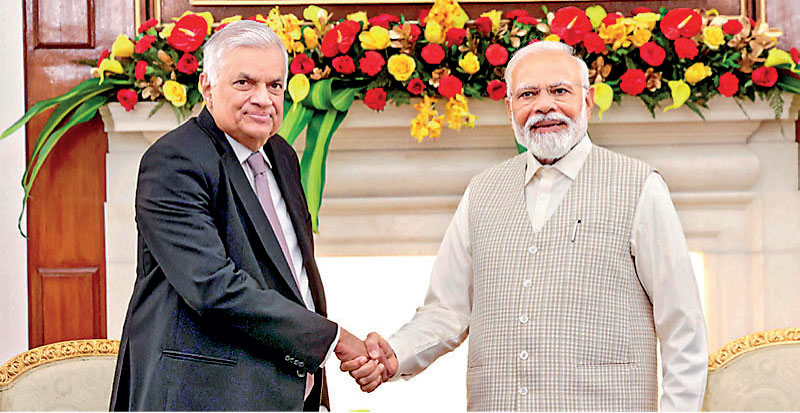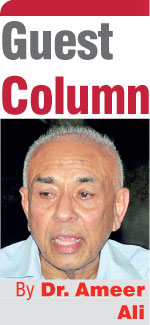Saturday Feb 14, 2026
Saturday Feb 14, 2026
Tuesday, 1 August 2023 01:12 - - {{hitsCtrl.values.hits}}

To NM that amendment is a non-issue in the wider context of Indo-Lanka relations, and to RW it is a trump card to win the game of thrones
|
 Reconciliation, or, more specifically, the issue of the Tamil National Question and within which the controversial 13th Amendment, has become a political drama staged with two main actors, Indian Prime Minister Narendra Modi (NM) and Sri Lankan President Ranil Wickremesinghe (RW). To NM that amendment is a non-issue in the wider context of Indo-Lanka relations, and to RW it is a trump card to win the game of thrones.
Reconciliation, or, more specifically, the issue of the Tamil National Question and within which the controversial 13th Amendment, has become a political drama staged with two main actors, Indian Prime Minister Narendra Modi (NM) and Sri Lankan President Ranil Wickremesinghe (RW). To NM that amendment is a non-issue in the wider context of Indo-Lanka relations, and to RW it is a trump card to win the game of thrones.
The 13th Amendment is a nonissue to Modi because of two important reasons. Firstly, that piece of legislation was the joint product of Rajiv Gandhi’s Congress Government and President J.R. Jayewardene’s Presidency of SL. Why should Modi insist on its implementation and allow his political rival Congress Party to claim credit for it? Moreover, Rajiv Gandhi Government itself was pressured to work on that amendment, because of Tamil Nadu’s DMK on whose support Rajiv’s Congress came to power in Delhi. Today, DMK is not a supporter of BJP and Modi came to power without DMK backing.
Secondly and more importantly, Modi sees Sri Lanka as a lucrative market for Indian investment and exports. As the second largest creditor to SL outside Paris Club, India wishes to capitalise on the island’s bankruptcy and colonise its economy with Indian capital and technology. India’s Adani Group, which is one of the principal backers of BJP, is particularly looking for Modi government to do everything within its power and influence to facilitate Adani penetration into SL. Already, and as a sign of economic subjugation, SL has decided to ditch the US dollar in preference for Indian rupee for some international transactions, and, according to Foreign Minister Ali Sabry, Indian rupee would soon become an acceptable currency in SL.
On top of all this is the geopolitical factor to prevent China from deepening its economic and strategic foothold in SL through China’s One Belt One Road. Given this economic and geopolitical reality why should Modi seriously be concerned about the rights of Tamils and implementation of the 13th Amendment except as a diplomatic token and advice RW casually to ensure a life of “dignity and respect” to that community? That covers the entire role of NM in this Tamil drama. Even the request to implement 13th Amendment came not directly from NM but from a statement by the Indian Foreign Secretary Vinay Mohan Kwatra. If TNA and other Tamil parties expect Delhi to play a more decisive role on their behalf, they would be sadly disappointed.
Modi also knows that the 13th Amendment is a hot potato to any SL president to handle, as he would have realised that in 2020 when RW’s predecessor Gotabaya Rajapaksa visited him and made the promise to implement it and retracted that promise immediately after returning to Colombo. The Sinhalese south is so dead against its implementation that Modi would be foolish to insist on it again. Thus, for all intents and purposes the 13th Amendment is a dead letter as far as NM is concerned. He is now promising instead to build houses for Tamils. Does he know what happened to the houses built by Saudi Arabia for the Muslim victims after the 2006 tsunami? Sinhala Buddhist supremacists claimed for a share and went to the courts and those houses still remain unoccupied and derelict. What is the guarantee they would not be repeated the same once India built houses for Tamils?
To the second actor in the drama, RW, the National Question and 13th Amendment serve a different purpose. He is trying to use them as an election winning card in the race for presidency. With deepening controversy within the UNP-SLPP coalition over nominating RW as its common candidate, he is searching for another route to capture the throne by standing as the UNP nominee with support from minorities. With his claim as the man responsible for pulling the economy out of its economic morass he is now trying to strengthen his candidacy by wooing the support of Tamils and Muslims. The promise to implement the 13th Amendment is his bait to trap Tamil votes. He wants the minorities to cover the shortfall of votes from the Sinhala Buddhist vote bank.
When RW initially declared his intention to implement that Amendment the saffron army supported by some parliamentarians came out in protest. A couple of Mahanayakas sent him an ultimatum to give up that idea. RW then asked the legislature either to implement that piece of legislation, which is already in the statutes book or remove it altogether. It was indeed a legitimate and sensible suggestion. But the legislature decided to do neither. Then, as a token of showing his commitment he invited the Tamil leaders for a dialogue, which, as expected, ended in nothing. Now, with no pressure from Delhi and with no support from the Sinhala Buddhist majority that amendment is fated to remain in the statute book as a museum piece. Where does that leave the Tamils and the issue of reconciliation?
From the time of the Federal Party’s satyagraha campaign in 1950s to the July 1983 pogrom followed by a 25 years civil war ending in 2009, and right through to the anti-Muslim riots of post-2009 almost one-third of the country’s citizens had remained virtually disconnected with the main currents of development in this country. Underlying this disconnection is a political structure and a political culture built on the edifice of Sinhala Buddhist hegemony. The supreme objective of this hegemony is to claim ownership over the entire country, which would invariably reduce all non-Sinhala-Buddhist citizens to second class status. To the hegemons, concentration of minority Tamils and Muslims in two of the nine provinces has become an eyesore.
Hence, their relentless efforts to change this unacceptable demographic topography and make it reflect the cultural hegemony of Buddhism and political hegemony of Sinhala Buddhists. The archaeological excavators, delimitation commissions and security forces are assisting in this mission. Until that goal is achieved there is no hurry for any reconciliation. RW’s enthusiasm is just a political drama.
However, this argument is valid only as long as the edifice on which the present political structure and culture remain untouched. The situation would change as soon as that edifice cracks. Sinhala Buddhist majoritarianism is that edifice on which the current political structure and political culture are modelled. These models have promoted competing brands of ethnoreligious nationalism, corrupt governance and economic ruin. Reconciliation and national unity, two vital elements to build a vibrant economy, are impossible to achieve unless this edifice is destroyed. And this is where the Aragalaya demand for system change becomes relevant.
Although the Aragalaya youth seem to have gone to sleep, that demand is still alive, and among all the political parties it is only NPP that is championing that change. Reconciliation cannot be forced upon from outside, and it has to come from inside out of self-realisation and change of hearts. But the system remains a stumbling block for that to happen. If RW is serious about reconciliation he should first apologise to the Tamils publicly for what the UNP Government did to them in July 1983. Without that his dialogue with Tamil leaders and meetings with other parties are only a drama. No wonder that NPP is keeping away from this tamasha.
(The writer is attached to Murdoch Business School, Murdoch University, Western Australia.)